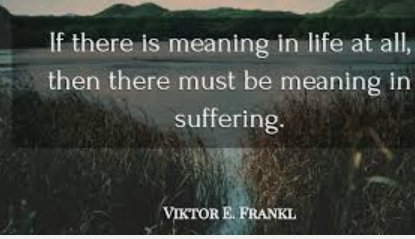
Operation Inspiration
Ok, I’ll admit it. I totally ripped off that title. It’s actually the title of the book written by Viktor Frankel, a Holocaust survivor who founded a school of psychotherapy called logotherapy. His premise was that as long as there is meaning in suffering, one can withstand it. I’ll give you an example.
The Torah tells us that “Pharaoh died, and the Children of Israel moaned from the labor.” R’ Asher Weiss asks, “The Midrash tells us that Pharaoh didn’t actually die. He really got tzoraas, and his doctors told him to bathe in the blood of Jewish babies. So that’s why they were crying. Why does the Torah tell us it was from the hard work?” His answer is astounding.
“As long as they had their children, with the hope for a future for them and future generations, they could persevere and handle the hard labor. But if their children were being murdered, what was the point in tolerating the work? That’s why they cried.”
As Dr. Frankl was being tortured by the Nazis, he realized that they could not take away his choice to make peace with his situation; to find growth and meaning in what he was going through. That’s what inspired him to establish his school of thought.
I’d like to submit that one need not suffer to find meaning. The world around us constantly gives us opportunities to find meaning and messages. The basic foundation upon which this meaning is established is the fact that there is a Creator, and He is still involved with His creations, much as a parent remains involved in the life of the child.
Once you have that as a given, you understand that the world is not chaotic and that events do not simply unfold. Of course, on second thought, maybe that’s a very apt expression, because unfolding implies that something was there all along, but covered or hidden, and it is now being revealed. When events in the world “unfold,” then we are being given a chance to see a bit more of the picture that Hashem has in mind for us. As each new bit of the drawing is shown to us, we can make better guesses at what the entire plan is.
Therefore, whatever happens around you, if you can find some purpose, then you can be reconciled with it. I recently saw a video put out by Aish.com which showed some of the many challenging scenes of 2020, but then followed with scenes of people helping, rejoicing, enjoying what they did have instead of mourning what they didn’t, and the punchline was that we can choose what we remember.
I, personally, went back and located a photo of my family, Erev Pesach, dressed in our Yom Tov finery for the Seder. It was taken by a neighbor who stood very far away in the early days of Corona. To me, that picture showed our resilience and ability to stand firm and faithful even when things around us seem to be crumbling.
Meaning is important. It helps us carry on. It uplifts us. It motivates us. We should not underestimate or minimize its power, nor trivialize it. I ghostwrite a Parsha sheet for a friend. One of the hallmarks of the sheet is that in addition to the text, it has pictures, which most of the time are humorous. Sometimes, though, I will opt to go with something meaningful even if it isn’t funny. I could get a quick, cheap laugh at a pun or joke, but if I use something meaningful that makes people think, it can last a lot longer.
Now, don’t get me wrong, humor is important. The main reason people pick up that Parsha sheet is for the jokes, and hopefully they stay for the Torah. Humor lifts people’s spirits and is an important aspect of human existence. But sometimes, I think we can dispense with the humor in favor of meaning.
On a neighborhood group chat, a fellow asked for roofing recommendations. I was about to write, “You should definitely have one.” But then I thought about it. Would that be helpful? Would it make him laugh, or would he find it annoying because I’m trivializing his suffering? I opted to remain silent. If he was asking for help, it meant he had a problem and if I wasn’t going to help, I could at least be sensitive and not make a joke.
It’s all part of our search for meaning. Life is not a joke, but if we seek deeper meaning and purpose behind the things we see and experience, we may very well have the last laugh.
© 2020 – All Rights Reserved
Did you enjoy this column? Feedback is welcome and appreciated. E-mail info@JewishSpeechWriter.com to share your thoughts. You never know when you may be the lamp that enlightens someone else.